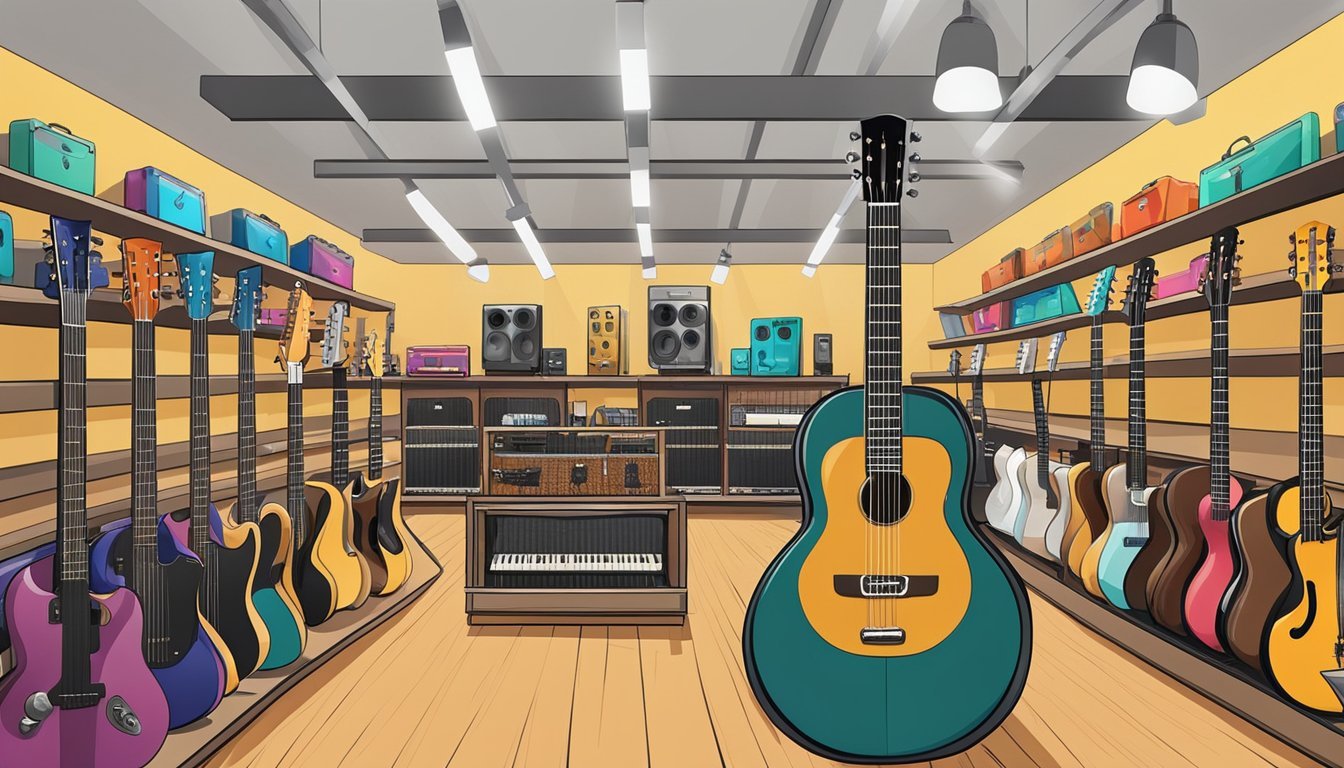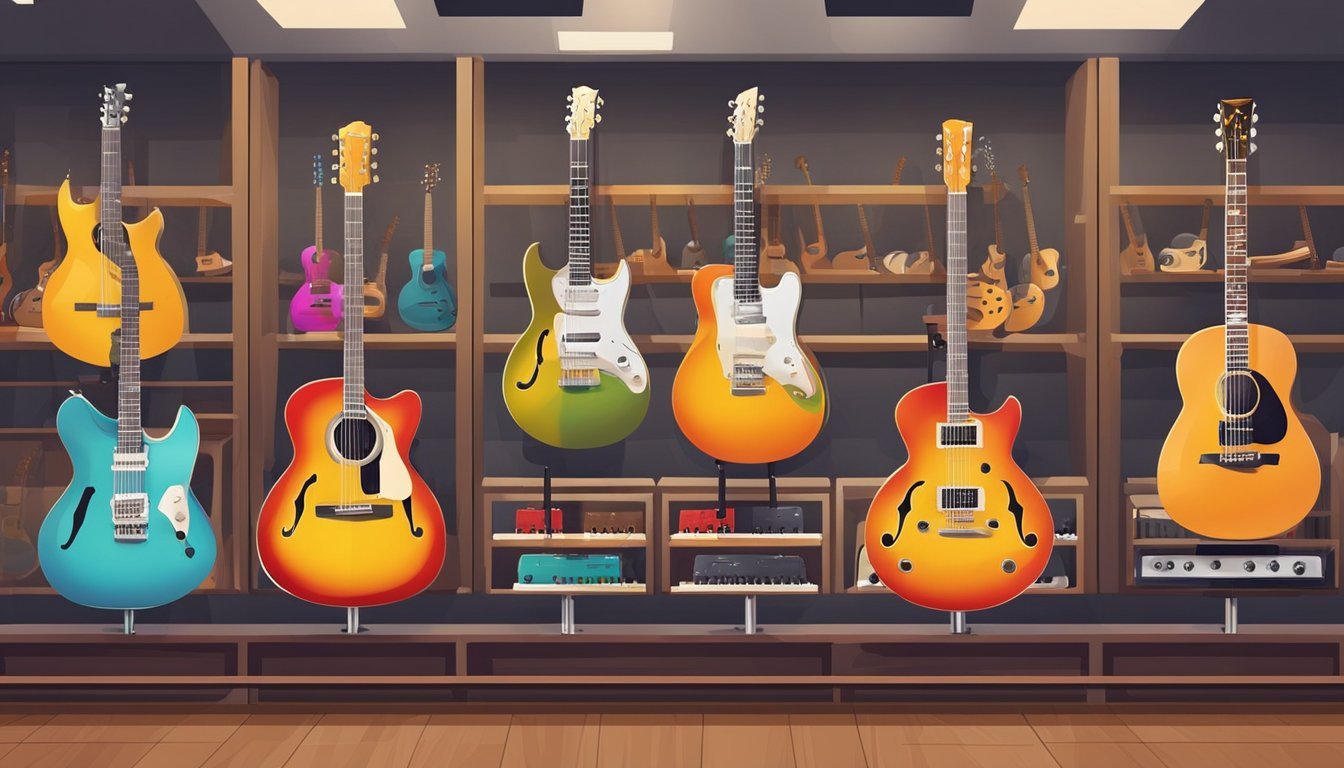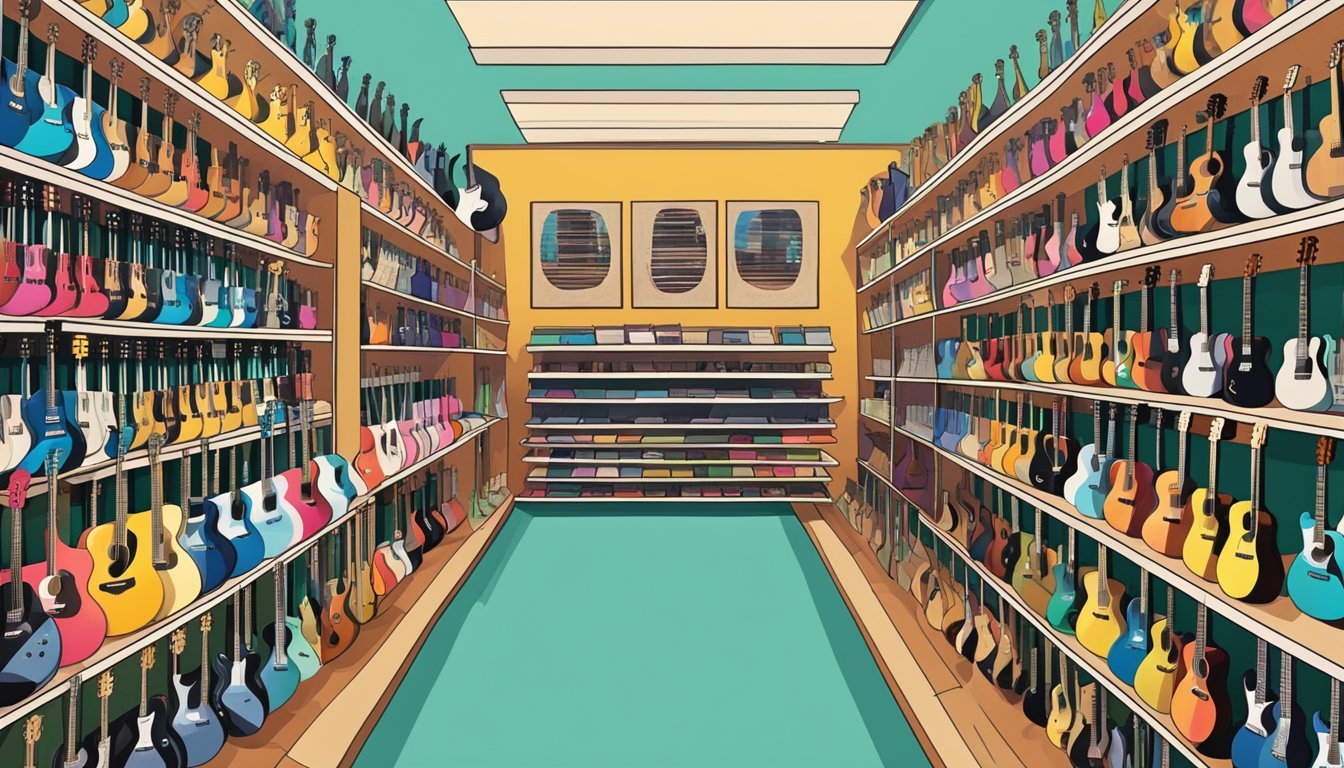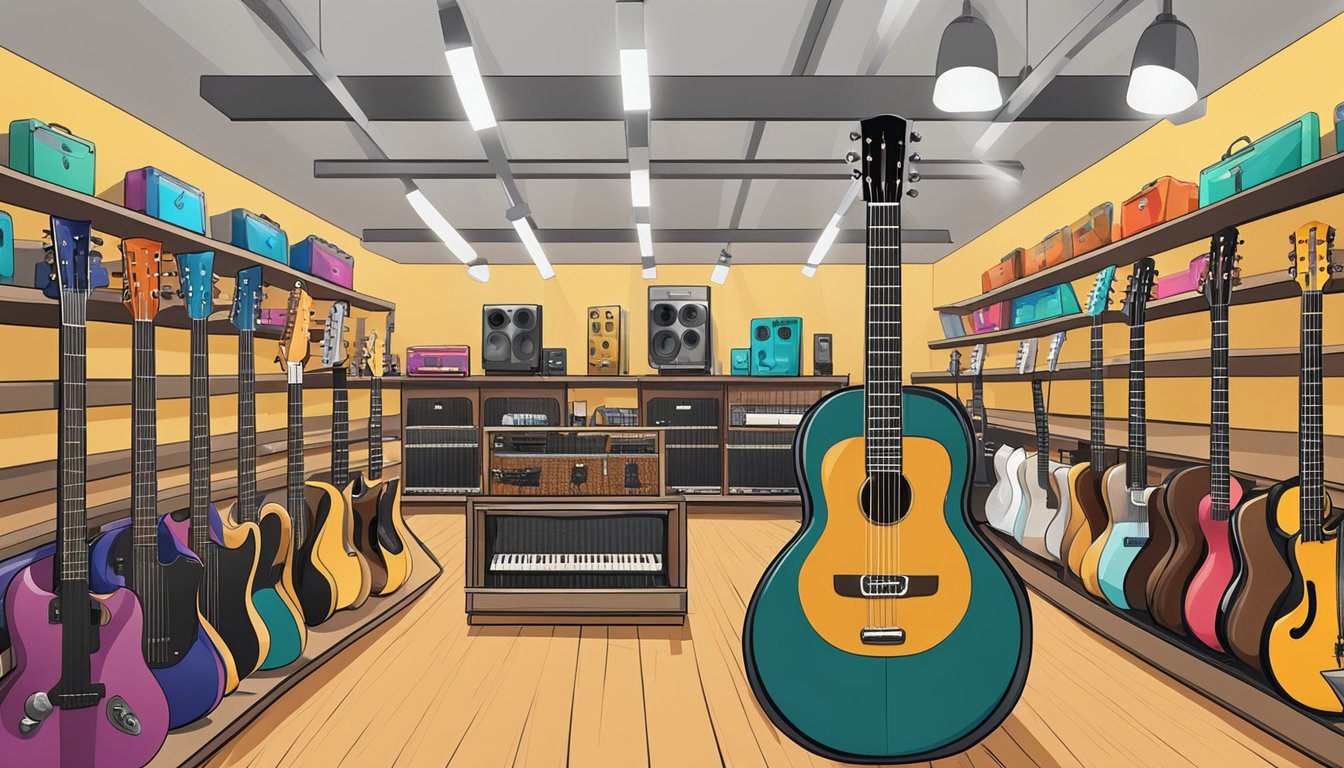Looking to buy a guitar? You’ve got plenty of options, whether you’re a beginner or an experienced player.
Places like local music stores, online retailers, and even second-hand marketplaces sell guitars.
Each option offers a unique experience, so it’s essential to know where to look to find the right fit for you.

When shopping for a guitar, consider what type of instrument matches your style.
From electric to acoustic, each type brings its own feel and sound.
Exploring your choices early on helps you make a confident purchase.
This journey can be exciting, so let’s dive into the best places to find a guitar and what to expect along the way.
Once you have your guitar, knowing how to care for it and what accessories you might need is key.
Finding the right spot to buy your instrument is just the beginning.
With the right information, you’ll be well-prepared to make a choice that fits your musical journey.
Key Takeaways
- You can buy a guitar at local shops or online retailers.
- Understanding different types of guitars helps narrow your choices.
- Learning about care and accessories enhances your musical experience.
Types of Guitars

When you’re shopping for a guitar, understanding the main types is key.
You’ll find two popular categories: acoustic and electric guitars.
Each has its own charm and purpose, so let’s break them down.
Acoustic Guitars
Acoustic guitars are all about natural sound.
These guitars produce sound through their hollow bodies.
This gives them a warm and rich tone, perfect for genres like folk, country, and blues.
Some well-known brands include Taylor and Martin.
They offer high-quality acoustic guitars that cater to different skill levels.
If you’re starting, you might want to look for a basic model.
If you’re more experienced, you can explore more premium options for enhanced sound quality.
You can find acoustic guitars in various sizes.
Smaller body types are easier to handle for beginners.
Bigger types give you a fuller sound but can be heavier.
Always try before you buy to see what feels right.
Electric Guitars
Electric guitars are designed for amplified sound.
They rely on pickups to convert string vibrations into electrical signals, which you then send to an amp.
This allows for a wide range of sounds and effects.
Popular brands include Fender, Gibson, and Ibanez.
Each brand has its signature models, catering to different music styles.
For example, Fender is famous for its Stratocaster, while Gibson is known for the Les Paul.
You’ll also need an amp to bring your electric guitar to life.
There are many options, from simple practice amps to professional setups.
Consider the style of music you want to play when choosing your gear.
Where to Buy

When you’re ready to buy a guitar, there are plenty of options available.
You can choose from online retailers, local music stores, or even secondhand options.
Each choice has its benefits, so consider what works best for you.
Additionally, it’s important to research the brands and models that interest you, as well as to read reviews from other musicians.
Online platforms often provide a wider selection and competitive prices, while local stores may offer the advantage of trying before you buy.
Whether you’re looking for vintage instruments or the latest releases, knowing where to find guitars for sale can greatly enhance your shopping experience.
Online Retailers
Online shopping is super convenient.
You can browse a huge selection of guitars from the comfort of your home.
Websites like Guitar Center and Sweetwater offer a variety of new guitars, accessories, and deals that can save you money.
Many online retailers also include customer reviews, which can help you make a good choice.
Plus, look for free shipping offers.
You might also find great deals and discounts on larger sales events.
Local Music Stores
Shopping at local music stores lets you connect with the community and try before you buy.
Stores often stock popular brands, including used guitars and vintage finds like a vintage Fender.
Friendly staff can help you pick the right guitar based on your skill level and budget.
You can also learn about local music events and classes, which adds to your overall experience.
Don’t forget to check for special promotions in-store.
Secondhand Options
Buying a secondhand guitar can save you cash and score some unique pieces.
Websites like Reverb and classified ads allow you to find great used guitars that might be hard to find new.
Inspect the guitar carefully and ask sellers lots of questions.
If you can, try to meet in person to play it before buying.
This way, you’ll know what you’re getting.
Remember, you can get a high-quality instrument without breaking the bank by exploring secondhand options.
Making the Purchase
When you’re ready to buy a guitar, understanding your financing options and knowing where to find the best deals can make a big difference.
These steps will help you make an informed choice.
Understanding Financing
Buying a guitar can be a big investment, but financing options are available to help you manage the cost.
Many retailers offer plans that let you pay over time.
You might see options like 24-month financing or 48-month financing.
With 24-month financing, your payments are spread over two years, which can be easier to handle if you’re on a budget.
Meanwhile, 48-month financing allows for lower monthly payments, but you’ll be paying over four years.
Make sure to check the interest rates and total cost.
Some options may have no interest if paid in full within a certain time.
Always read the fine print to understand your commitments.
Finding the Best Deals
Guitar prices can vary, so hunting for the best deals is worth your time.
Start by checking local music shops and large retailers like Guitar Center or online stores.
Websites like Musician’s Friend often have sales or promotions.
Don’t forget to keep an eye out for holiday sales or clearance events.
You might find guitars at a reduced price or even bundled with accessories like picks, strings, and cases.
Also, consider signing up for newsletters from your favorite stores.
They often send exclusive discounts and deals right to your inbox.
Comparing prices across different platforms can help you snag a good price.
After the Purchase

Once you’ve bought your guitar, it’s time to think about some essential accessories and how to record your music.
These tools will enhance your playing experience and allow you to capture your melodies effectively.
Accessories and Gear
First up, consider getting a few accessories to complement your new guitar.
A quality guitar strap is a must if you plan to play standing up.
Look for one that’s comfortable and adjustable.
Next, you’ll need a tuner to keep your guitar sounding great.
Clip-on tuners are easy to use and affordable.
Don’t forget strings! Having extra sets on hand is always smart since they wear out over time.
If you play electric guitar, investing in an amplifier can really help you shape your sound.
Look for a practice amp that suits your needs without breaking the bank.
Recording Your Music
Recording your music can be an exciting part of your journey.
Start with some basic recording gear.
A simple USB microphone can capture your sound well.
You might also want to explore recording software.
Programs like GarageBand or Audacity are great for beginners and often free.
They allow you to play around with your tracks and add effects.
If you’re feeling ambitious, consider getting an audio interface.
This connects your guitar to your computer, giving you professional sound quality.
You can easily layer tracks, add background instruments, and produce a polished song.
Recording is not just about playing; it’s about sharing your music with the world!
Frequently Asked Questions
It’s natural to have questions when buying a guitar, especially if you’re new to the scene.
Here are some common queries that can help guide your shopping experience.
What’s the best place to grab a guitar for a newbie?
For beginners, a local music store can be a great choice.
They often have knowledgeable staff who can guide you.
Plus, trying out different guitars in person can really help you find one that feels right for you.
Any tips on how to pick a guitar that suits me?
Think about what style of music you want to play.
If you like strumming chords, an acoustic might be best.
If you’re into rock, an electric guitar could be your go-to.
Don’t forget to consider your comfort with the guitar’s size and shape.
I’m on a tight budget. What’s the cost of a decent starter guitar?
Decent starter guitars can range from about $150 to $500.
Brands like Yamaha and Fender often offer great options at lower prices.
You can also look for used guitars, which can save you some cash.
Where’s the coolest spot to buy electric or acoustic guitars?
Popular music shops often carry a good selection of both electric and acoustic guitars.
For convenience, online retailers like Guitar Center or Sweetwater offer a wide variety.
Just make sure to check their return policy.
Any favorite stores for snagging guitars that won’t break the bank?
Stores like Guitar Center and Sam Ash usually have budget-friendly options.
Don’t overlook local shops either; they might have discounts or used guitars priced to sell.
Online platforms like Reverb also offer access to deals from individual sellers.
What should I look out for when getting my first guitar?
Make sure the guitar is comfortable and playable.
Also, check if the guitar is tuned properly and inspect it for any damages.
Always ask to try it out.
The right fit can make a huge difference in your playing experience.

